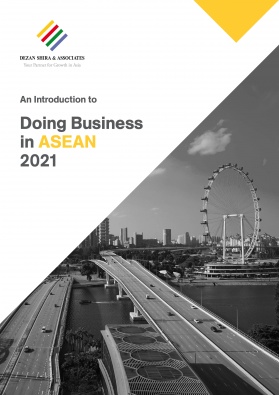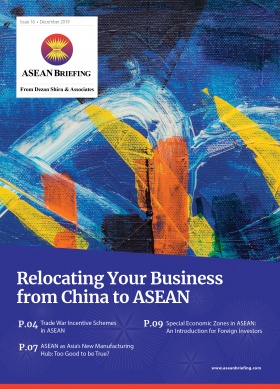Brunei Launches Economic Blueprint: Salient Features
- Brunei Darussalam launched the Brunei Economic Blueprint in early January 2021, which provides guidelines on how the country can develop a dynamic and sustainable economy.
- The blueprint is part of the government’s Brunei Vision 2035, which aims to diversify the country’s economy away from petroleum, which contributes to 95 percent of exports.
- The blueprint focuses on highlighting the importance of reskilling the labor force, seeking open trade policies, and promoting a conducive business environment, among others.
In early January 2021, Brunei Darussalam’s Ministry of Finance and Economy launched the Brunei Economic Blueprint, which provides guidelines for the country to achieve the third goal of the Brunei Vision 2035 strategy — developing a dynamic and sustainable economy.
Vison 2035 was inaugurated by the Sultan in 2007, with the aim of transforming Brunei through three goals:
- Goal 1: The accomplishments of its highly educated and skilled people;
- Goal 2: Providing one of the best quality of life in the world for its people; and
- Goal 3: Developing a dynamic and sustainable economy.
The economic blueprint will focus on ‘six aspirations’ namely:
- Developing a productive and business environment by leveraging technology and innovation;
- To promote continuous learning, training, and reskilling of the workforce;
- Ensure the economy is open and globally connected;
- Ensure preservation of the environment;
- Develop infrastructure to support and grow businesses; and
- Ensure good governance and public service excellence.
The country aims to diversify its economy away from oil and gas, which contributes to 95 percent of export earnings, transforming the small nation on the island of Borneo into the fifth richest nation in the world with a GDP per capita of US$61,000 based on PPP in 2020.
It is because of this high dependence on the oil and gas sector that poses major risks to the economy in the medium-to-long term. Risks to the sector include disruptions in oil and gas production, geopolitical risks, and the slowdown in major global economies amplified by the COVID-19 pandemic and trade tensions.Aspiration 1: Developing a productive and business environment
The government is looking to prioritize five priority sectors to spearhead economic development. These are:
- Downstream oil and gas;
- Food;
- Tourism;
- Information and communication technology (ICT); and
The government will promote local micro, small, and medium-sized enterprises (MSMEs) — which constitute 90 percent of total enterprises — to be more export-orientated, as well as encourage businesses to leverage emerging technologies and innovation to increase productivity and competitiveness.
Through this, the government hopes Brunei can be an attractive foreign direct investment (FDI) destination in ASEAN, which in turn will help create meaningful, high-value employment for its local workforce.
Aspiration 2: Promote continuous learning, training, and reskilling of the workforce
The economic blueprint aims to ensure that Brunei’s workforce is ‘future-ready’, through continuous reskilling to meet industry demand.
Digital inclusiveness will be made available in education and training programs for all citizens, including mid-career workers.
Other policy directions include strengthening research and development capacity to support industrial development. The Brunei Research Council was established to encourage research in the fields of:
- Science, technology, and engineering;
- Social science; and
- Arts and culture.
The government hopes this blueprint will address unemployment among the youth cohort, which is considered to be the highest in ASEAN at close to 30 percent.
Aspiration 3: An open and globally connected economy
Brunei has shown its commitment to participate in open trade policies with its regional and global partners.
As a member of ASEAN, the country is now a member of the recently signed Regional Comprehensive Economic Partnership (RCEP) free trade agreement (FTA) — touted as the world’s biggest trade bloc.
In addition, the country is part of the following FTAs:
- ASEAN Free Trade Area (AFTA);
- ASEAN-Australia-New Zealand Free Trade Area (AANZFTA);
- ASEAN-China Free Trade Area (ACFTA);
- ASEAN-India Free Trade Agreement (AIFTA);
- ASEAN-Japan Comprehensive Economic Partnership (AJCEP);
- ASEAN-Korea Free Trade Agreement (AKFTA);
- Brunei-Japan Economic Cooperation Partnership Agreement (BJEPA); and
- Trans-Pacific Strategic Economic Partnership Agreement (TPSEP/P4).
Brunei was ranked 149 out of 190 in 2019 in the World Bank’s ‘Trading Across Borders’ category – it is eager to improve this ranking through sectoral reforms and improving trade facilities for businesses.
Aspiration 4: Sustainable environment
This aspiration aims to not only preserve Brunei’s environment but also develop green initiatives that can contribute to economic development.
Some 72 percent of the country is covered in pristine rainforest, and 58 percent of this is conserved under the Heart of Borneo initiative. This initiative is a government-led and NGO program aimed to conserve Borneo’s biodiversity, which accounts for six percent of global biodiversity.
The government will promote research and development for environmentally friendly and resource-efficient technologies, in addition to promoting investments in more green industries. The government will also limit any land and environmental degradation for economic development activities.
Aspiration 5: Infrastructure development
The drive for economic diversification has led to significant spending in various infrastructure projects throughout the country from industrial parks to telecom to the national transport network.
The government will continue to improve land, sea, and air connectivity to boost productivity, as well as the uninterrupted supply of water and electricity to homes and businesses. Already 100 percent of the population has access to electricity.
As part of the blueprint, industrial sites will be ‘infrastructure ready’ and new developments will be strategically located near ports and road networks. The government aims to achieve this through public-private partnerships (PPP).
ICT infrastructure readiness and accessibility is another area the government is looking to prepare for developing a digital economy. Fixed broadband connections for households and businesses reached 51 percent in 2019.
Aspiration 6: Good governance and public service excellence
Ensuring accountable and transparent governance will be an important driver of social equity, inclusivity, and political stability in Brunei.
This means the free flow of information between government, businesses, and citizens and a strong legal system that ensures independence, and fairness in its provisions.
The government will also continue to update and reform regulations that enforce global standards and that promote a more conducive business environment.
About Us
ASEAN Briefing is produced by Dezan Shira & Associates. The firm assists foreign investors throughout Asia and maintains offices throughout ASEAN, including in Singapore, Hanoi, Ho Chi Minh City and Jakarta. Please contact us at asia@dezshira.com or visit our website at www.dezshira.com.








